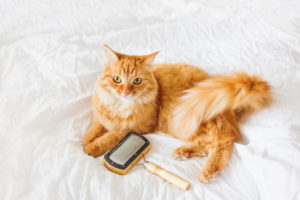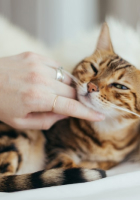Cats are exceptional self-groomers, but as a cat owner, there are some things you can do to help your feline maintain its healthy skin and happy mood. Don’t believe what they say; a bathed, groomed cat is a happy cat. From bathing to brushing and nail care, a little spa day goes a long way. Here are some basic cat grooming tips and advice for cat owners and trainee cat groomers.
Why Do Cats Self Groom?
Grooming does a lot more than keep your cat clean. It maintains firm and healthy skin by spurring the creation of an oily substance called sebum. Constant licking unfurls the sebum across the coat to lubricate and preserve the fur and give it that clean glow. The apparent reason is that it also removes loosened hair and dirt and fleas and ticks. But too much sebum can be a problem and at this point, the grooming should be handled by the owner.
As a cat owner, learning how to groom your cat properly is important, especially if your cat plans on being a permanent resident. Grooming your cat will require these three activities: bathing, brushing, and nail trimming. If you are new to the ‘Living With A Cat’ club and wondering, “Do cats need baths?” or “How often should I groom my little monster?”, the next section will provide some of these answers.
Bathing

Yes, cats need baths every 4-6 weeks. Cats have a bad habit of getting into sticky situations. If you notice your cat’s coat becoming smelly or sticky, a bath will do nicely in keeping their skin healthy and shining. Bathing a cat will require you to do the following:
- Give your cat a thorough brushing to get rid of all loose hair and mats.
- Put a rubber mat in your tub to provide a solid foundation.
- Use a spray hose to thoroughly soak your cat, be careful not to spray directly in the eyes, ears, or nose.
- Tenderly rub in your cat shampoo.
- Thoroughly rinse your cat.
- Dry your cat with a towel.
Brushing
Brushing can be done regularly. Weekly sessions with a comb or a brush will help keep your cat’s fur in great shape by getting rid of dirt, preventing knots, and keeping their skin clean and parasite-free. Brushing will vary depending on your cat’s hair length. Not brushing your cat’s fur can lead to unpleasant tangles and a body full of dead hair, so make sure to set some time for those weekly brushing sessions.
If your kitty has short hair, once a week will suffice. Using a metal comb, work through your cat’s fur from head to tail. Using a rubber or bristle brush, remove loose hair while being gentle near her belly and chest.
Long-haired, indoor cats who shed all year long need grooming sessions every two-three days to get rid of loose hair. Starting with the abdomen and legs, lightly comb your way through the fur all the way to the head and comb the neck fur upward, toward the chin.
Skin Issues
Cat owners should be aware that the condition of their cat’s skin is a reflection of their health. If you’ve noticed your cat scratching and licking excessively, then some skin issues are probably the reason. From external factors, such as fleas and sensitivities to periodical pressures and anxiety, there may be a more prominent problem affecting your cat’s skin. Skin issues are one of the most typical reasons why cat owners seek professional help.
Symptoms of Skin Issues
- Scaly patches on the face and paws
- Dry or irritated skin
- Hair loss, bald patches
- Hairballs
- Rashes
- Swellings, lumps or skin discoloration
- Constant scratching and licking around the head and neck
- Scabs
- Redness or inflammation
- Drainage of blood or pus
Ear Care
It’s no secret that a cat’s ears can pick up even the slightest sounds, but even those cute little ears could still use a bit of help staying clean. Monitoring your cat’s ears once a week for wax and germs will help those delicate sound spotters remain sharp.
Monitoring Your Cat’s Paws
Cats need pedicures too! Maintaining healthy feet is important for cats to climb, scratch, and perform their incredible acrobatic feats. As a cat owner, you should routinely check and clean your kitty’s paws and make sure they remain unscathed.
Aside from causing mild discomforts, harmful elements that stick to your cat’s paws may end up in its mouth through self-grooming. If your schedule allows it, give your cat’s paws a soft wipe with a wet tissue, thoroughly checking between the toes and around the paws at least once a day. A little tip: Keeping your floors debris-free can help tremendously in keeping your cat’s feet clean.
Nail Care
Chances are, your cat is not a fan of nail trimming and usually disappears when you pull out the clippers. Luckily for you, these steps will help your kitty relax while you take care of those nails.
- Pick a chair in a serene room where you can easily and calmly sit your cat on your lap.
- Gently take one of your cat’s paws and massage it for a few seconds.
- Watch out for the quick! You know, the pink part of your cat’s nail. That is where the nerves and blood vessels are. DO NOT TOUCH this delicate area.
- While your cat is facing away from you, massage the toes and press the pad until the nails come out. The rest is up to the clippers.
Cat owners should do a nail-trimming session every 8 to 10 days to keep those nails clean and danger-free. If your cat downright refuses to let you clip its nails, you might want to take her to the groomer and let them deal with it.
Takeaway
As opposed to some pets, cats are not that hard to take care of–a nice advantage for cat owners. But like every other pet, your kitty could use a helping hand every once in a while. As autonomous as your cat may be, it still needs its human to keep its skin healthy and shining.
Keep in mind: Some breeds simply cannot stand being groomed. If your cat continually resists the grooming process, please leave it to the trained groomers.











